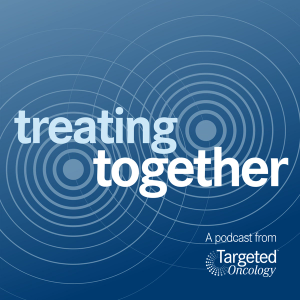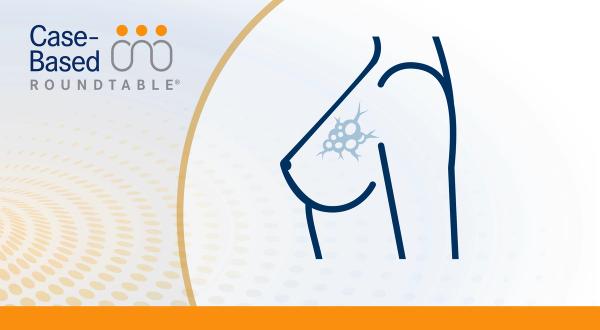Conference Coverage
about 16 hours ago
ADCs Could Move Up the Treatment Line in GI Cancersabout 1 month ago
Giredestrant Yields Lower Treatment Discontinuation vs SOCTrending on Targeted Oncology - Immunotherapy, Biomarkers, and Cancer Pathways
Latest News
Shorts









Podcasts

Navigating the Future of CLL Care
Experts explore the evolving landscape of chronic lymphocytic leukemia treatment, highlighting targeted therapies, MRD strategies, and future innovations.

Supporting Community Oncologists in a GU Research Era
Explore the vital role of community oncology in GU cancer treatment, bridging research and real-world applications for better patient care.

Gut Health & Myeloma: How Bacteria May Predict Transplant Success With Pooja Phull, MD
A study reveals the gut microbiome's role in predicting multiple myeloma outcomes, highlighting butyrate-producing bacteria as key indicators of patient survival.

Experts Delve Into Organ Preservation for Genitourinary Cancers
Benjamin Garmezy, MD, and Alexander Kenigsberg, MD, discuss strategies for preserving organs in GU cancers in the Treating Together podcast.

Navigating Modern Lung Cancer Treatment and Clinical Trial Access
Edward S. Kim, MD, MBA, and Neel Shah, MD, discuss advancing lung cancer care and tackling real-world access barriers for community physicians in the Treating Together podcast.

Advancing Prostate Cancer Treatment With Shared Decision-Making
In our first episode of Treating Together, Benjamin Garmezy, MD, and Ralph J. Miller Jr, MD, discuss multidisciplinary prostate cancer care.

Predicting Palbociclib Outcomes in Breast Cancer Using Deep Learning
Xiaojie Zhang, MD, and Akshat Singhal, PhD, discuss their research leveraging deep learning to predict how patients with ER+/HER2- breast cancer will respond to palbociclib.

BMT CTN 1902 in Myeloma: Key Findings With Garfall
In this episode of Targeted Talks, Alfred L. Garfall, discusses the phase 2 BMT CTN 1902 trial of idecabtagene vicleucel in patients with multiple myeloma.

Exploring Innovations in Lymphoma Treatment With Russler-Germain
David A. Russler-Germain, MD, PhD, discusses his path in oncology and the many advancements shaping lymphoma treatment today.

Behind the FDA Approval of Dato-DXd in HR+/HER2– Breast Cancer With Bardia
In this episode of Targeted Talks, Aditya Bardia, MD, MPH, FASCO, discusses the recent FDA approval of datopotamab deruxtecan in breast cancer.
Videos
Continuing Medical Education
All News

A recent study reveals significant progress in biomarker testing for lung cancer in community settings, highlighting the need for improved access to targeted therapies.

During his presentation at the 4th Annual Miami Cancer Institute Precision Oncology Symposium, Petros Grivas, MD, PhD, FASCO, provided a detailed roadmap for community oncologists with an emphasis on precision medicine.

FDA reviews new drug applications for rivoceranib and camrelizumab as first-line treatments for advanced liver cancer, promising improved survival rates.

During a live event, Sumanta K. Pal and other oncologists discuss the safety and efficacy of belzutifan for advanced renal cell carcinoma, highlighting management of anemia and hypoxia.

FDA prioritizes review of datopotamab deruxtecan for treating metastatic triple-negative breast cancer, showing significant survival benefits over chemotherapy.

A groundbreaking phase 2 trial explores a novel, chemotherapy-free immunotherapy for relapsed indolent B-cell lymphomas, aiming to enhance patient outcomes.

Discover the latest advancements in pancreatic cancer treatment, including targeted therapies and next-generation sequencing, transforming patient care and outcomes.

The FDA granted orphan drug designation to IFx-2.0, an injection designed to enhance immune response, in cutaneous melanoma.

Gemogenovatucel-T shows remarkable survival benefits in high-risk ovarian cancer patients, highlighting its potential as a new standard of care.

FDA reviews zanzalintinib and atezolizumab for metastatic colorectal cancer, offering hope for patients with limited treatment options.

FDA fast-tracks QTX-2101, an oral arsenic trioxide therapy, enhancing treatment accessibility for acute promyelocytic leukemia patients.

New data reveals CD47 expression as a key biomarker for predicting evorpacept's effectiveness in treating HER2-positive metastatic breast cancer.

Discover how antibody-drug conjugates (ADCs) are transforming treatment strategies for gastrointestinal cancers, enhancing precision and patient outcomes.

January 2026 marks a pivotal month in oncology, with the FDA advancing numerous innovative therapies for challenging cancers, emphasizing precision medicine.

Discover the latest FDA approvals and groundbreaking trial results in cancer treatments, including myeloma, pancreatic cancer, and melanoma advancements.

BioInvent's BI-1808 combined with pembrolizumab shows promising antitumor activity in recurrent ovarian cancer, offering hope for better treatment options.

The LARA trial reveals promising results for pembrolizumab and lenvatinib in treating recurrent clear cell gynecological cancer, showcasing effective antitumor activity.


New research uncovers how genetic ancestry influences head and neck cancer biology, paving the way for personalized treatment strategies and improved patient outcomes.

Neoadjuvant pembrolizumab showed promising high response rates and melanoma-specific survival outcomes in desmoplastic melanoma.

Lirafugratinib shows promise as a second-line treatment for cholangiocarcinoma, achieving significant response rates and durable outcomes in clinical trials.

A large-scale analysis reveals novel predictors of survival and resistance mechanisms in metastatic breast cancer treated with T-DXd, enhancing patient stratification.

A novel granule formulation of selumetinib shows promise for treating pediatric patients with inoperable neurofibromatosis type 1-related tumors, enhancing medication accessibility.

The FDA reviews ivonescimab for advanced lung cancer treatment, showing promising trial results and potential to enhance patient outcomes post-TKI therapy.

New trial data show onvansertib enhances treatment response and progression-free survival in RAS-mutated metastatic colorectal cancer, paving the way for future therapies.

The FDA granted fast track designation to a GPRC5D bispecific T-cell engager for multiple myeloma following positive safety and response outcomes in a dose escalation trial.

FDA grants orphan drug designation to CTD402, a promising CAR T therapy for relapsed T-cell leukemia and lymphoma, enhancing treatment accessibility.

The COLIBRI study reveals that neoadjuvant dual immune checkpoint blockade enhances treatment outcomes for locally advanced cervical cancer, showing promising immune responses.

NCCN updates guidelines to include sacituzumab govitecan as a first-line treatment for metastatic triple-negative breast cancer, enhancing patient options.

Precision medicine revolutionizes endometrial cancer treatment, emphasizing molecular drivers and the challenges of next-generation sequencing in clinical decision-making.

A new clinical trial evaluates survival outcomes for recurrent head and neck cancer, comparing surgery with neoadjuvant chemotherapy and immunotherapy.

A novel neoadjuvant therapy combining PD-1 blockade and chemoradiotherapy shows promising results in treating patients with advanced rectal cancer with high Immunoscores.

Nutritional status significantly impacts survival and treatment outcomes in cervical cancer patients, highlighting the need for routine nutritional screening.































